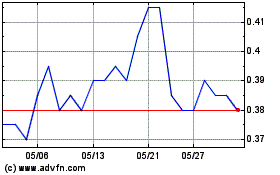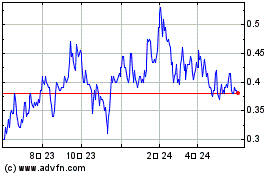Investors Look to the "Saudi Arabia of Uranium" as Supply Crunch Looms
2014年3月26日 - 2:35AM

Upward pressure on uranium prices is intensifying as the widely
forecast uranium supply crunch draws closer. A worldwide nuclear
reactor construction boom and Japanese plans to restart reactors
this summer means demand is climbing while production delays and
the end of the US/Russian Megatons-to-Megawatts program have
reduced supply by an estimated 84 million lbs. per year.
In this perfect storm of increasing demand and vulnerable
supply, investors are focusing on the source of the world's richest
uranium deposits: Canada's Athabasca Basin, where Fission Uranium
(TSX-V:FCU) has just drilled its best off-scale results to date at
PLS - its high-grade, shallow depth uranium discovery.
Fission's drill results are among the best ever encountered in
the Athabasca Basin, with one recent hole (hole 129) labeled by
analysts as the top hole in the uranium industry because of its
grade, thickness and shallow depth. It was calculated by one
analyst that even with the current uranium spot price, hole 129 was
equivalent to 117m of 5 oz/t gold, i.e. 150 g/t. Assays for the
hole include large intersections with grades nearly 380 times the
world average for uranium.
Just yesterday, the company announced new drill results,
including one (hole 187) that far surpasses the amount of off-scale
mineralization for hole 129.
"Hole 129 has been called the top hole in the industry and now
we've got one that's 47% bigger," says Fission CEO, Dev Randhawa.
"Not only that but we've just connected another two high-grade
zones of mineralization along the 1.78 on-trend strike length. Our
new high-grade zone is now approximately 780 in length."
"When we talk about off-scale," explains Randhawa, "We're
referring to the fact that the radioactivity of the drill core is
so high that our even our highly sensitive equipment can't measure
it properly. So if you've got off-scale then you know you've got
high grade. You need assays to give you the full picture but it's a
strong indicator. You just have to look at the assays we've been
announcing over the last twelve months to know we've got something
very special at PLS."
"People call the Athabasca Basin the 'Saudi Arabia of Uranium'
because the grades are so high and the deposits can be very large.
Even so, the results at PLS are simply amazing and not just because
of our grades and size of intercepts. Deposits in the Basin are
incredibly hard to find but we've got a drill hit success rate of
nearly 100% with our current program."
"What's just as important," adds Fission President and Chief
Geologist, Ross McElroy, "Is our discovery is so shallow. Until we
hit at PLS, the prevailing theory was that the shallow deposits in
the region had all been found and mined out. Companies were going
deeper and deeper to find uranium. Then we discovered PLS and
everything changed."
Fission is just over half way through a 100-hole drill program.
Today's announcement includes results from nine new holes, all of
which intersected wide intervals of mineralization and seven of
which returned substantial off-scale mineralization.
Fission has led the resurgence in uranium exploration with its
PLS discovery, so much so that at the 2014 PDAC awards – often seen
as the Oscars for the mining industry – President and Chief
Geologist, Ross McElroy won the prestigious Bill Dennis Award for
Exploration Success.
In addition, The Northern Miner magazine, one of the top mining
trade publications, went on to name McElroy and Randhawa as 'Mining
Persons of the Year 2013" due to the success of the discovery and
the decisions of Management that spurred the company's growth.
Fission's success has led to a flood of exploration activity by
other companies in the previously underexplored South West area of
the Athabasca Basin and just recently NexGen announced a uranium
discovery at a property adjacent to PLS. Other companies active in
the region include Fission's spin out - Fission 3.0 Corp.
(TSX-V:FUU), Fission JV partners, Brades Resource and Azincourt
Uranium, as well as others such as Areva, Cameco and Aldrin.
Major mines in the Athabasca Basin include Rabbit Lake (186
million lbs. produced), Cigar Lake (22.3% U3O8), McArthur River
(16.5% U3O8), Maclean Lake (50 million lbs. produced) and Cluff
Lake (60 million lbs. produced).
Fission is currently trading at $1.68 with a market cap of
$555.2 million.
Legal Disclaimer/Disclosure: A fee has been
paid for the production and distribution of this Report. This
document is not and should not be construed as an offer to sell or
the solicitation of an offer to purchase or subscribe for any
investment. No information in this article should be construed as
individualized investment advice. A licensed financial advisor
should be consulted prior to making any investment decision.
Financial Press makes no guarantee, representation or warranty and
accepts no responsibility or liability as to its accuracy or
completeness. Expressions of opinion are those of the authors only
and are subject to change without notice. Financial Press assumes
no warranty, liability or guarantee for the current relevance,
correctness or completeness of any information provided within this
article and will not be held liable for the consequence of reliance
upon any opinion or statement contained herein or any omission.
Furthermore, we assume no liability for any direct or indirect loss
or damage or, in particular, for lost profit, which you may incur
as a result of the use and existence of the information, provided
within this article.
Also, please note that republishing of this article in its
entirety is permitted as long as attribution and a back link to
FinancialPress.com are provided. Thank you.
CONTACT: Fission Uranium Corp.
700 - 1620 Dickson Avenue
Kelowna, British Columbia
Canada, V1Y 9Y2
Telephone: +1 250-868-8140
Telephone (for journalists): +1 604 679 6190
Fax: +1 250-868-8493
Toll Free: 1-877-868-8140
F3 Uranium (TSXV:FUU)
過去 株価チャート
から 10 2024 まで 11 2024

F3 Uranium (TSXV:FUU)
過去 株価チャート
から 11 2023 まで 11 2024
